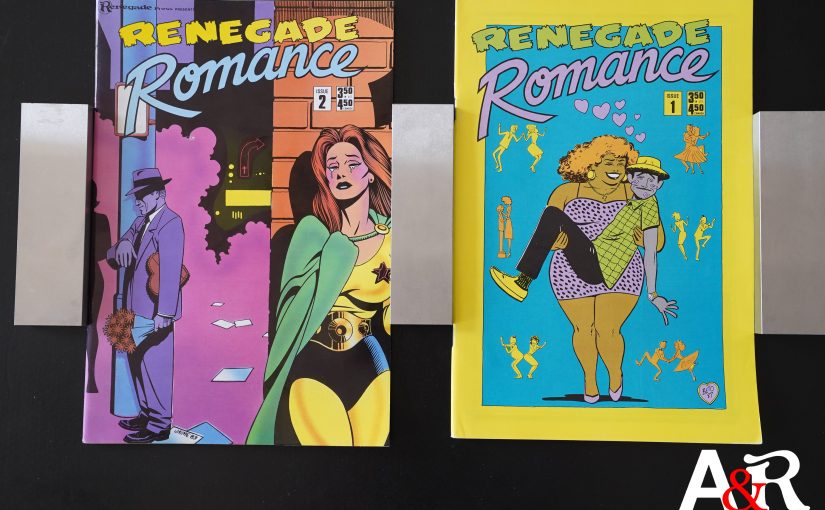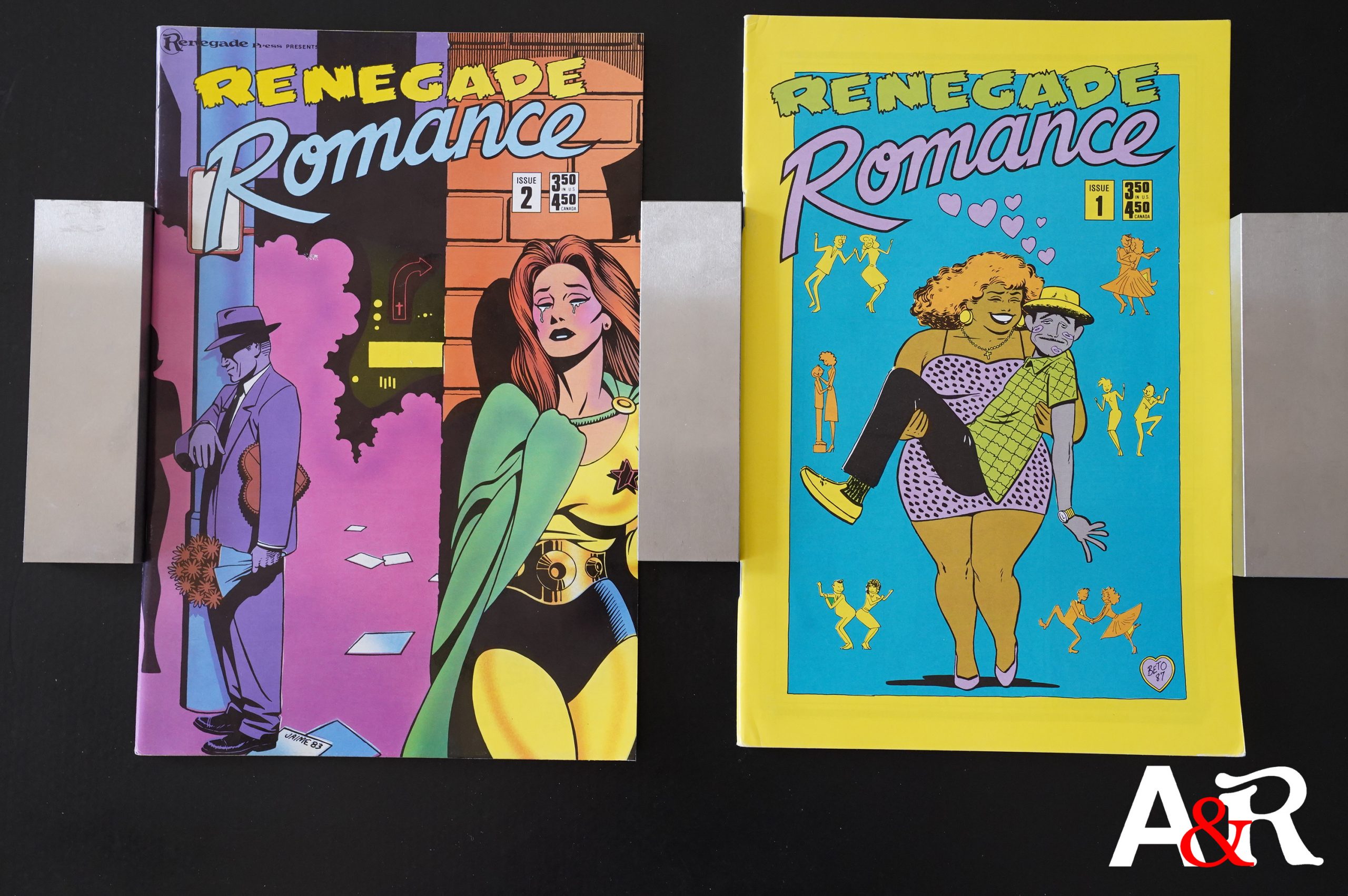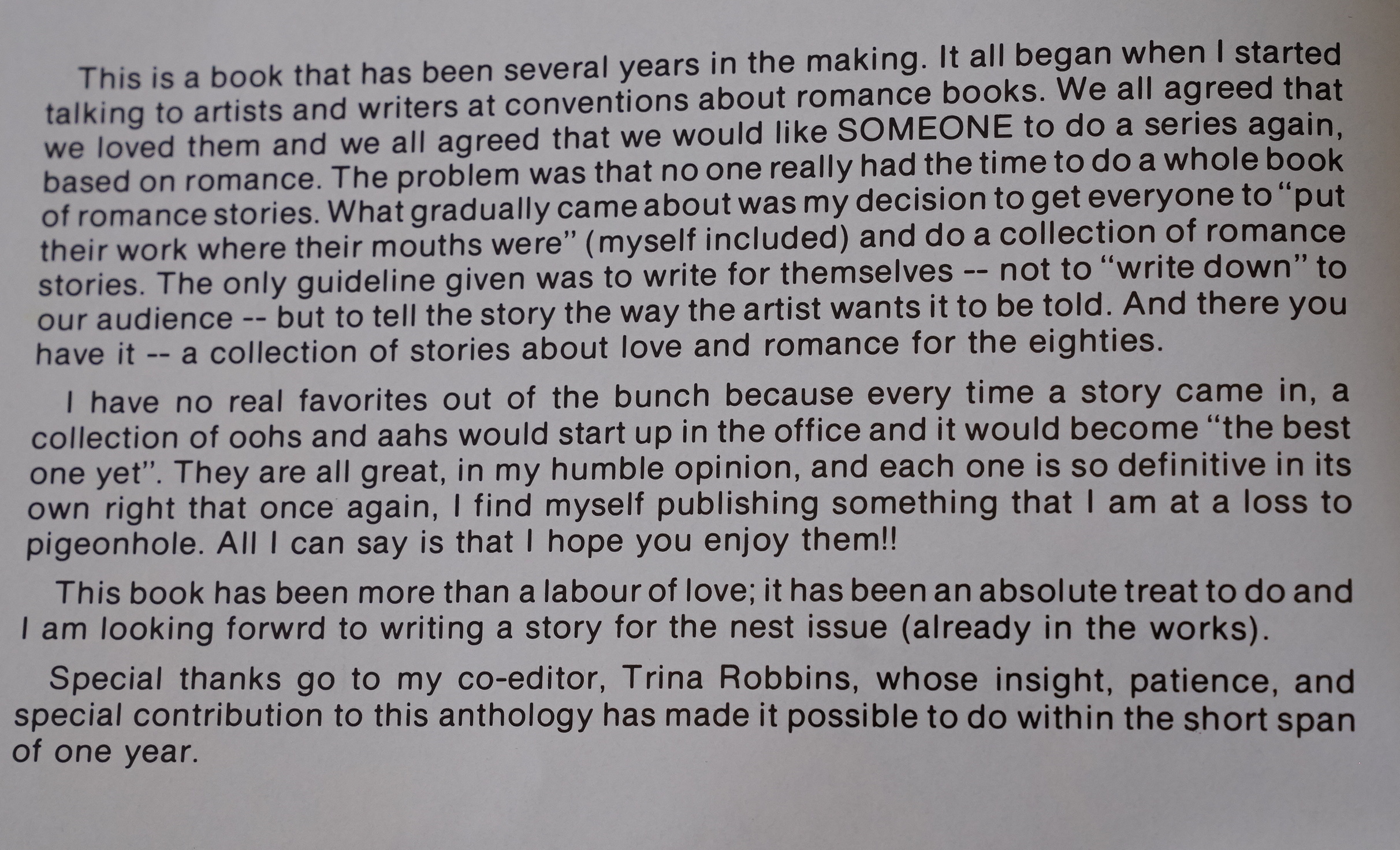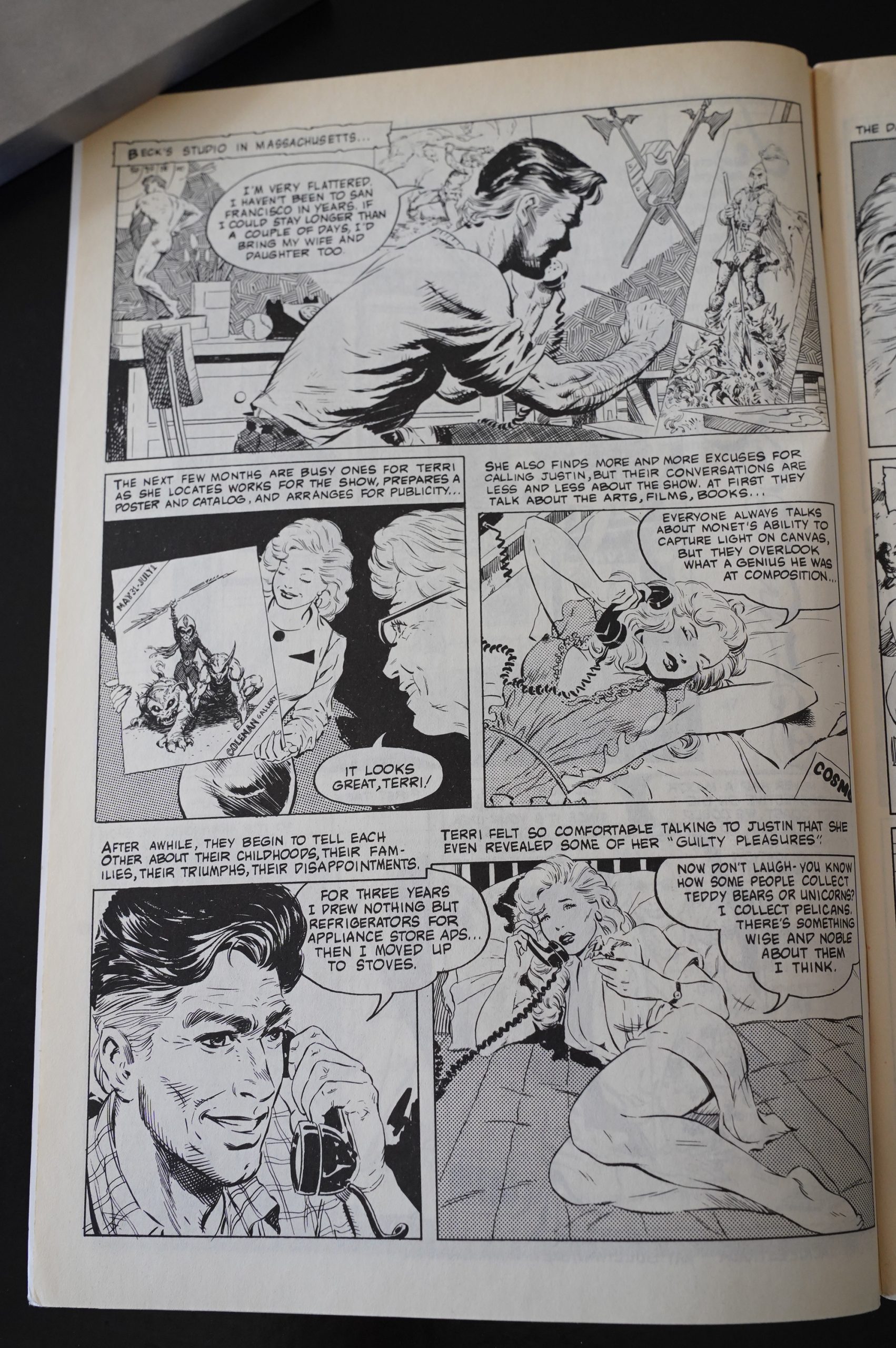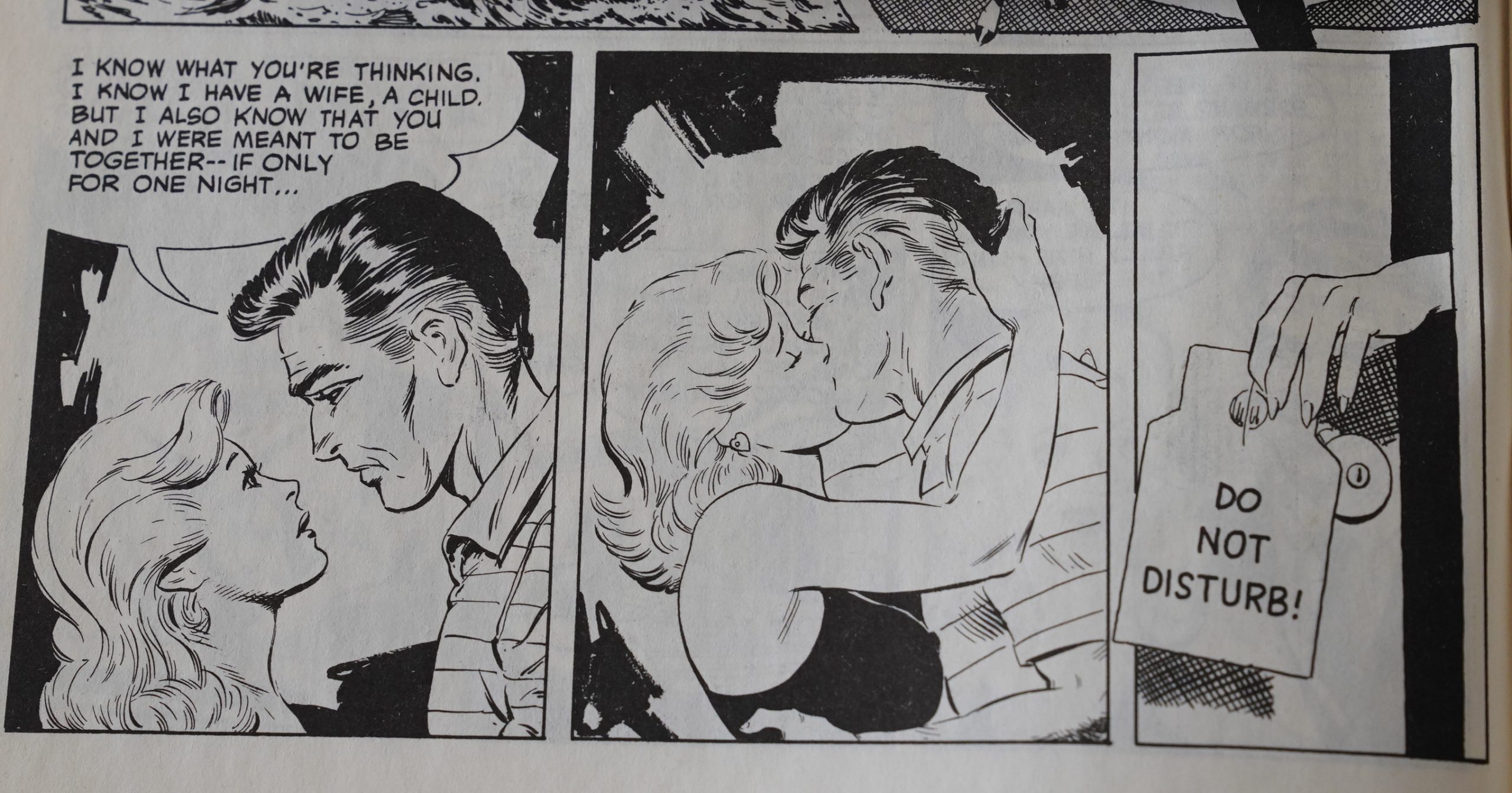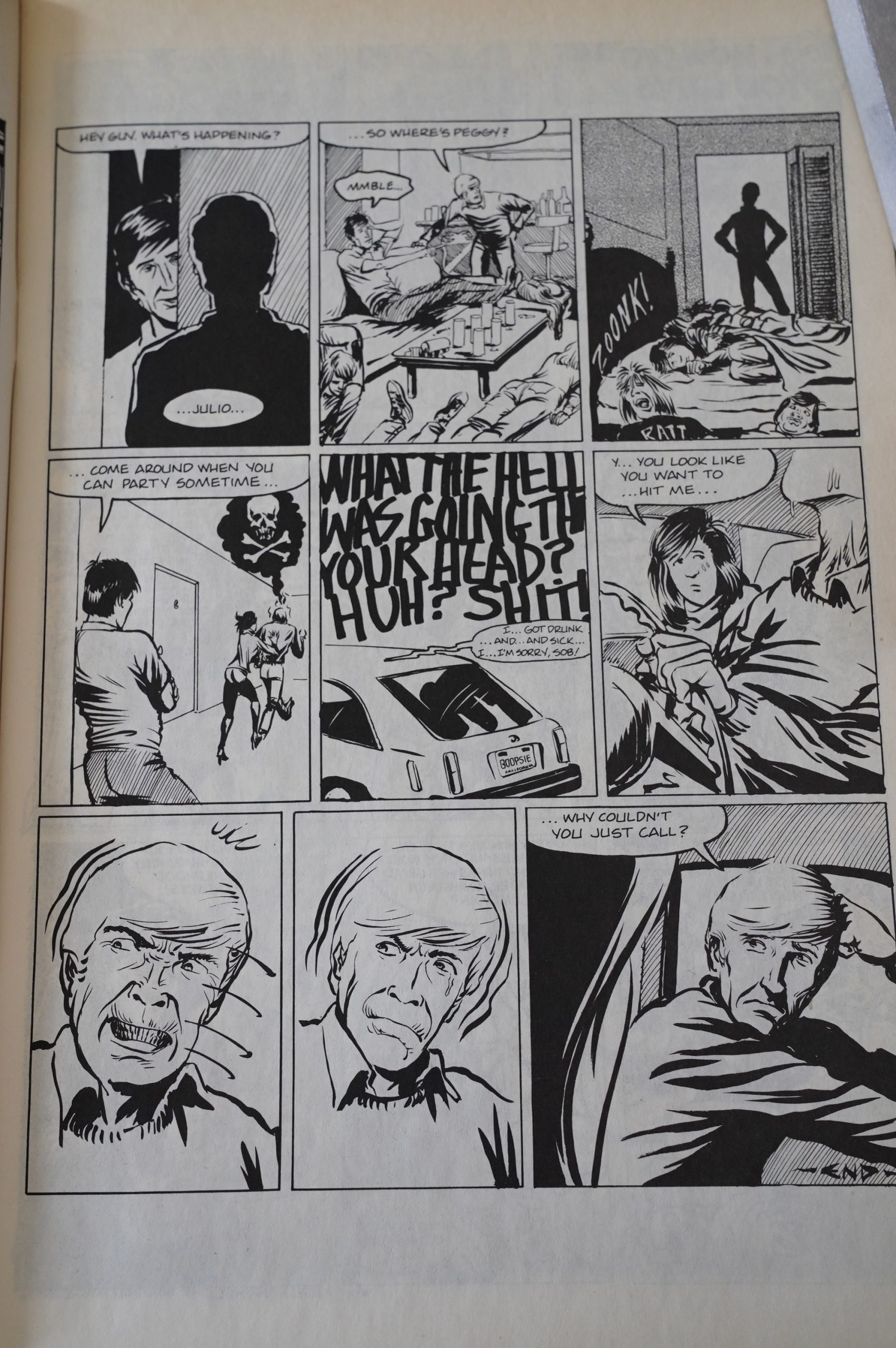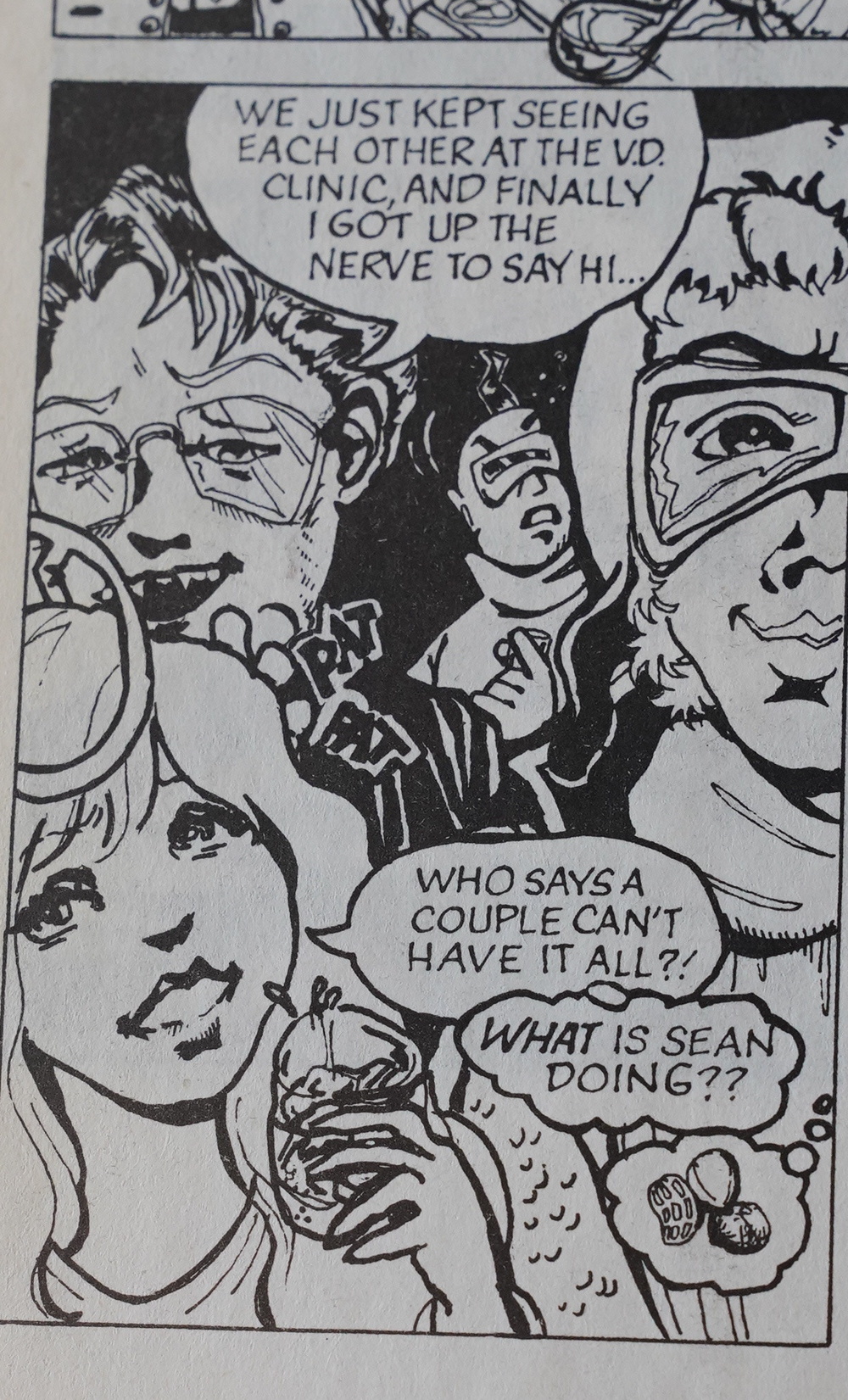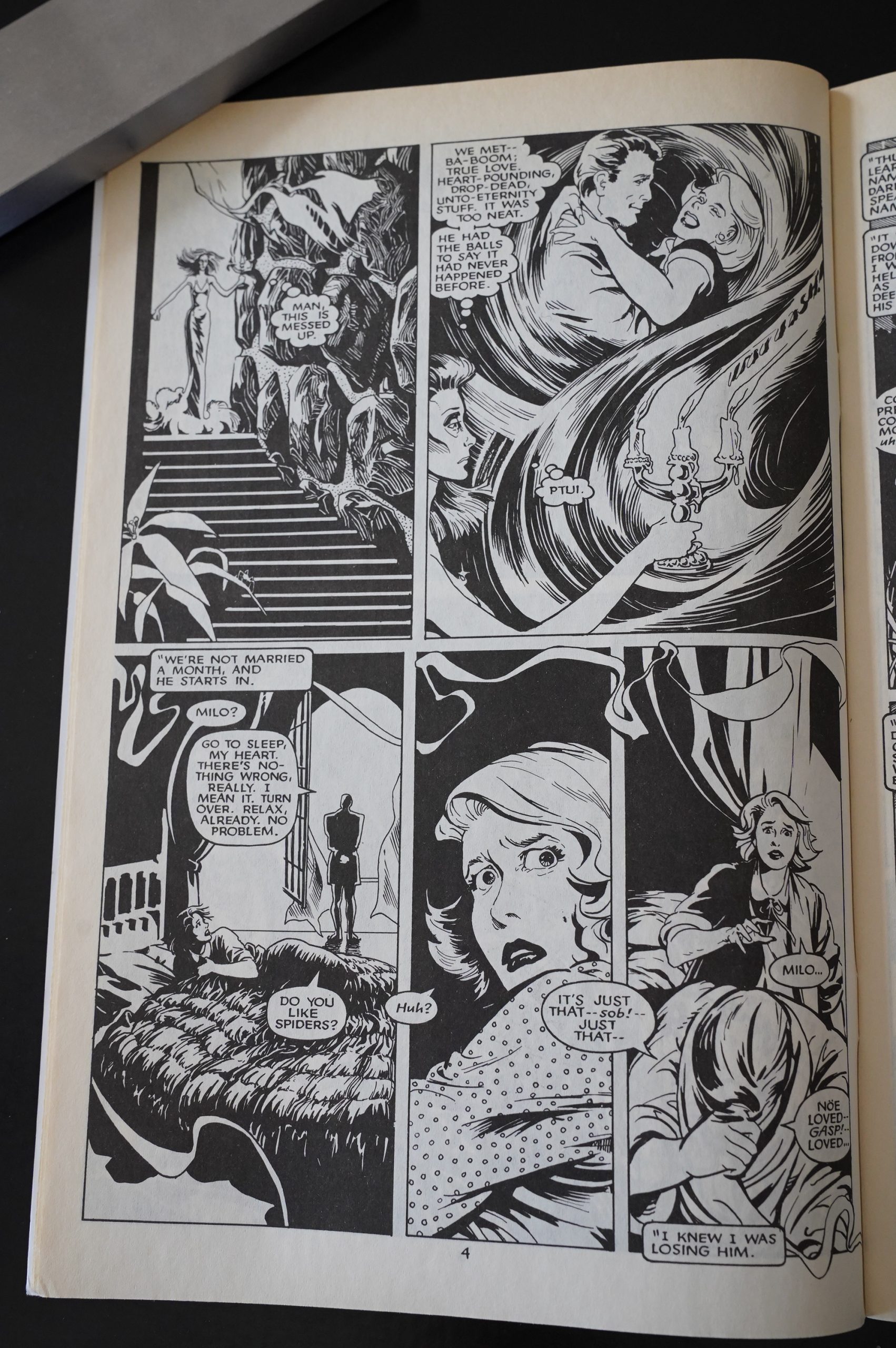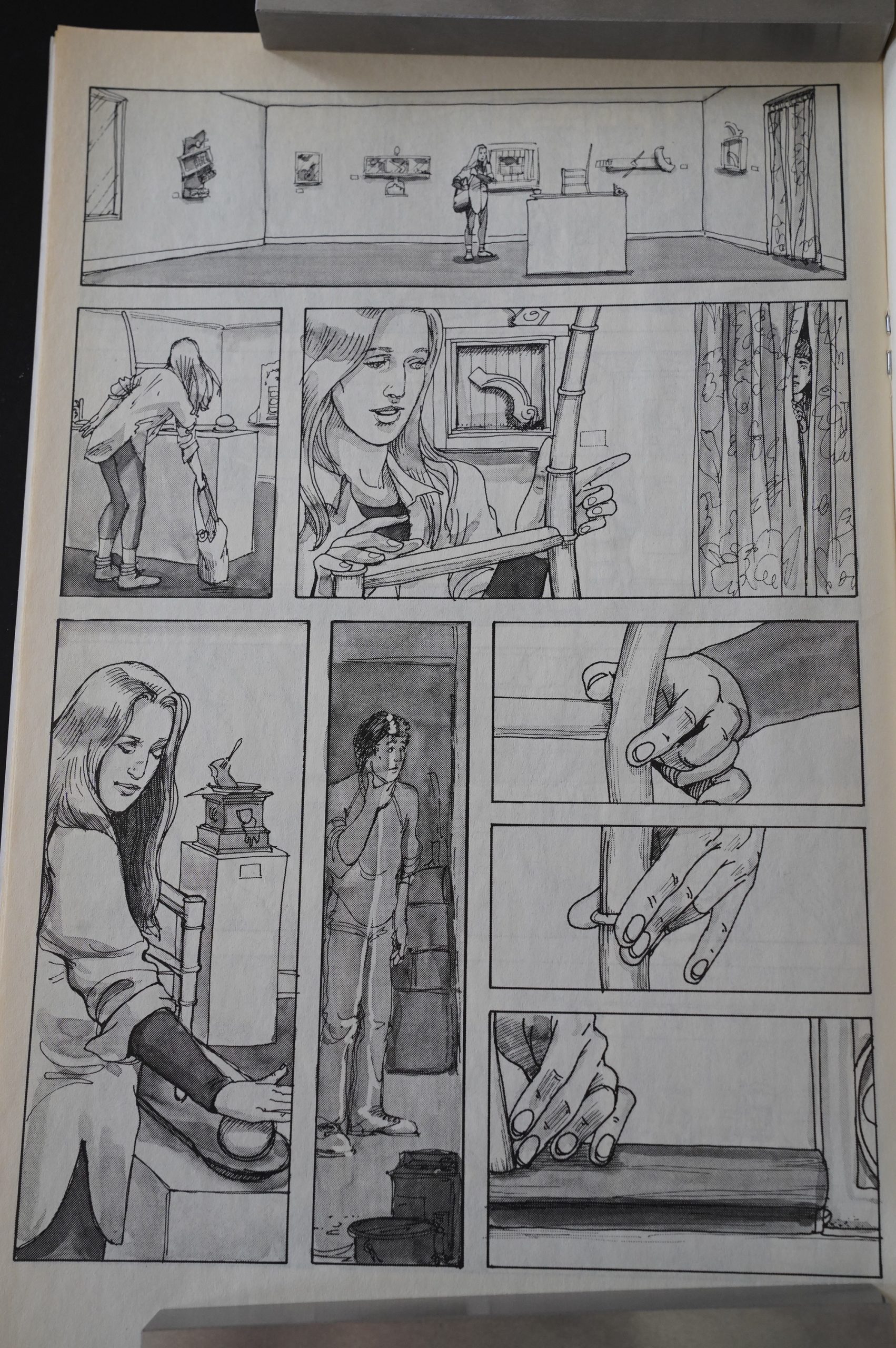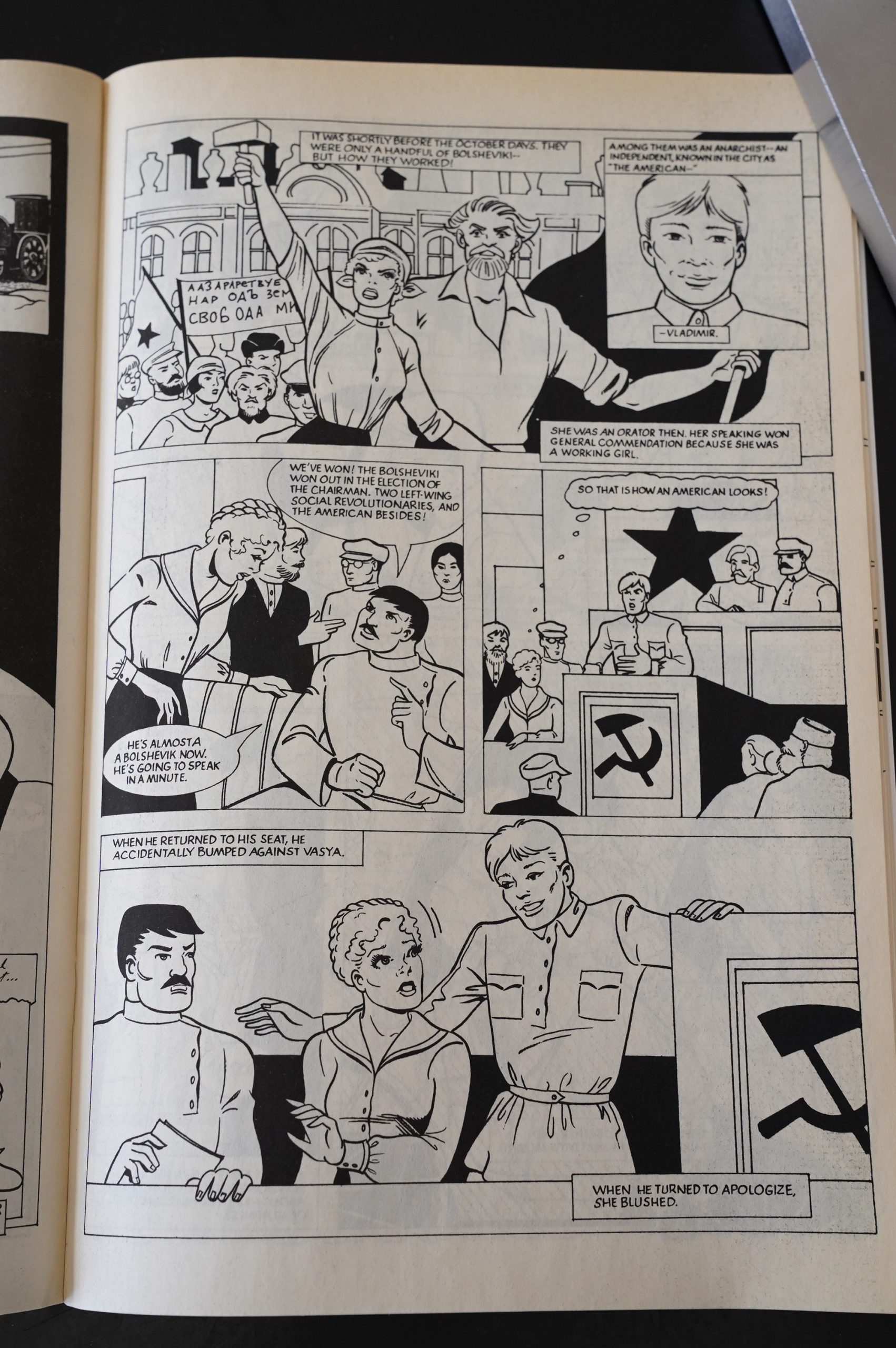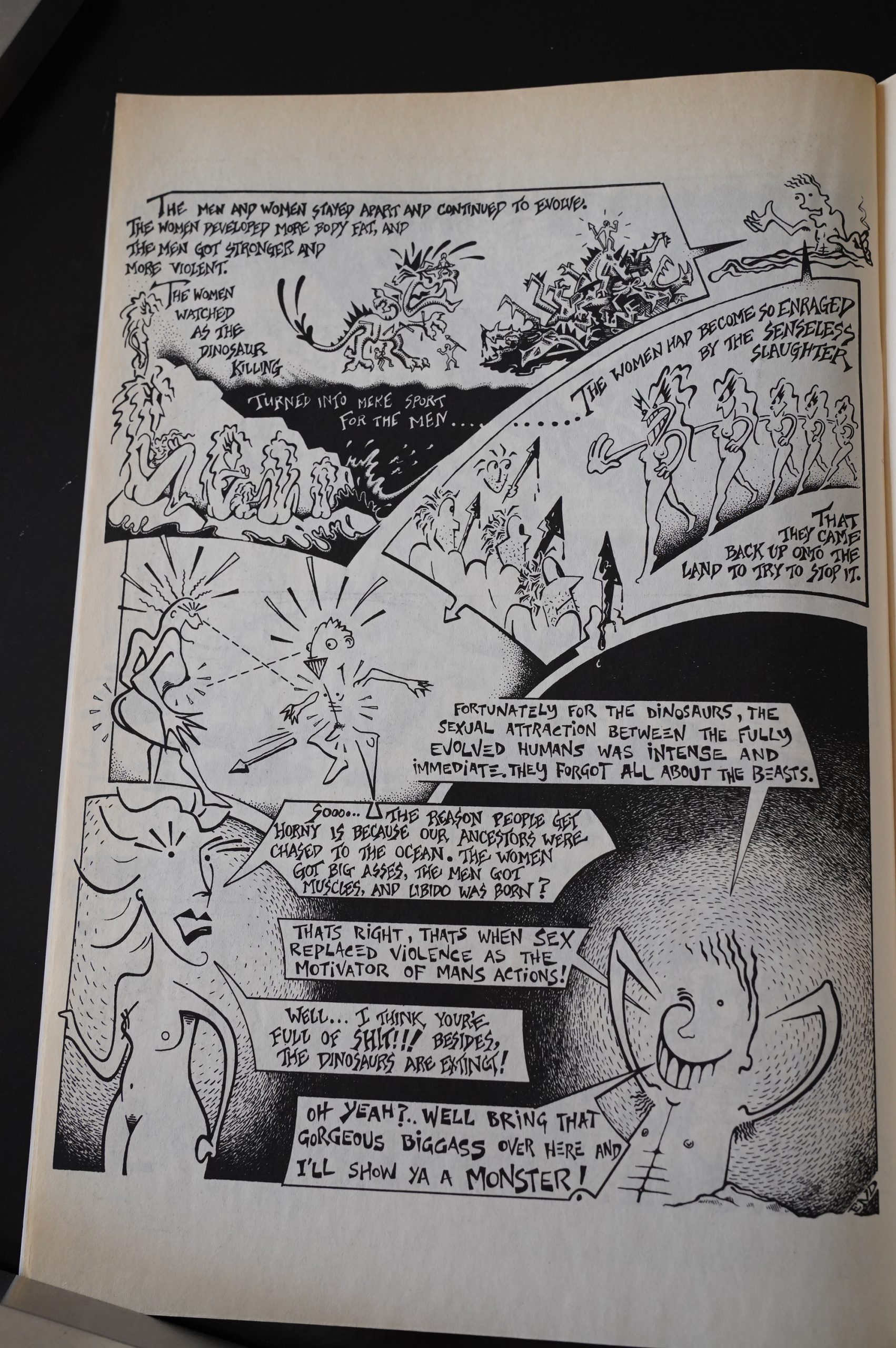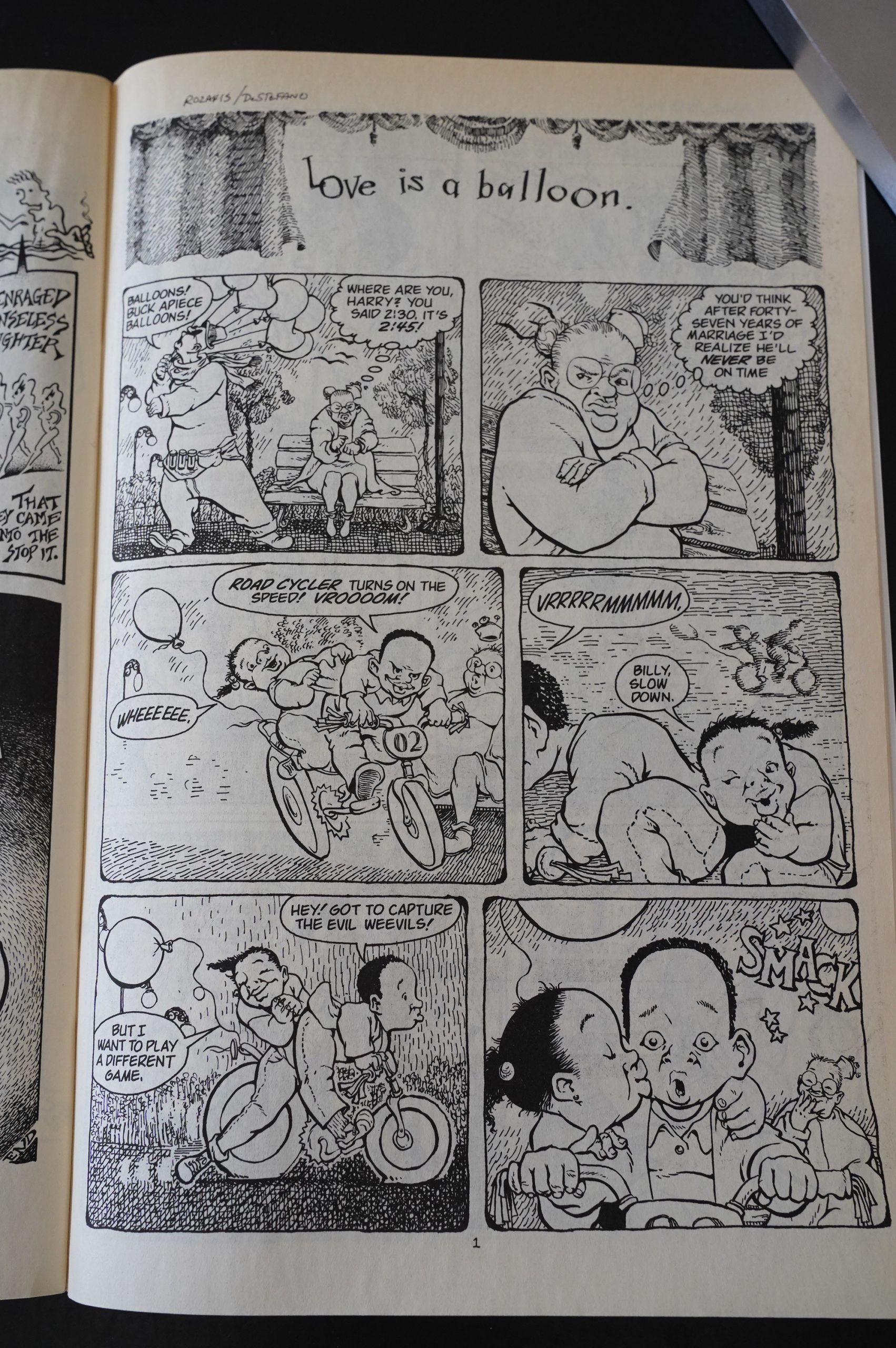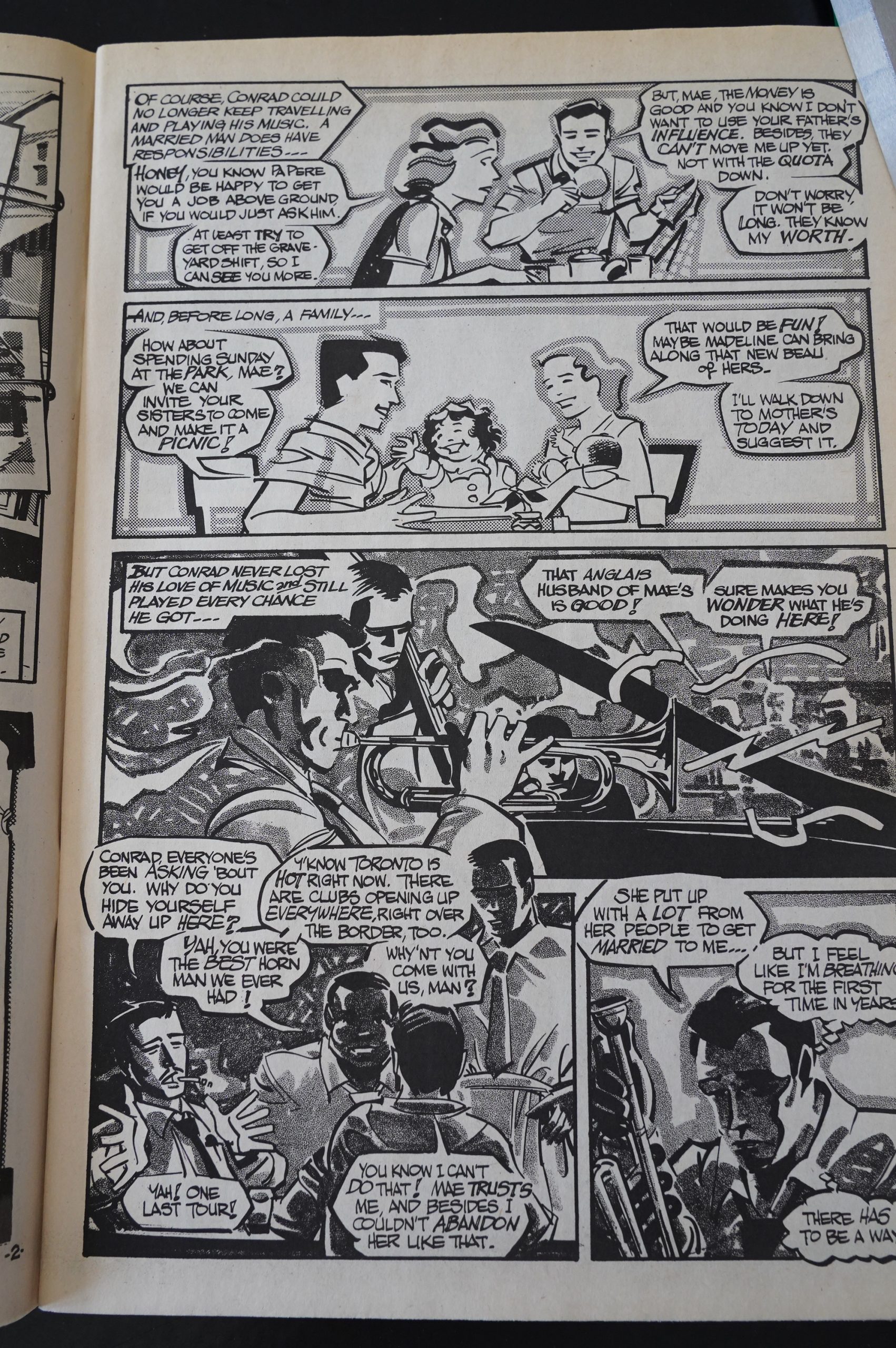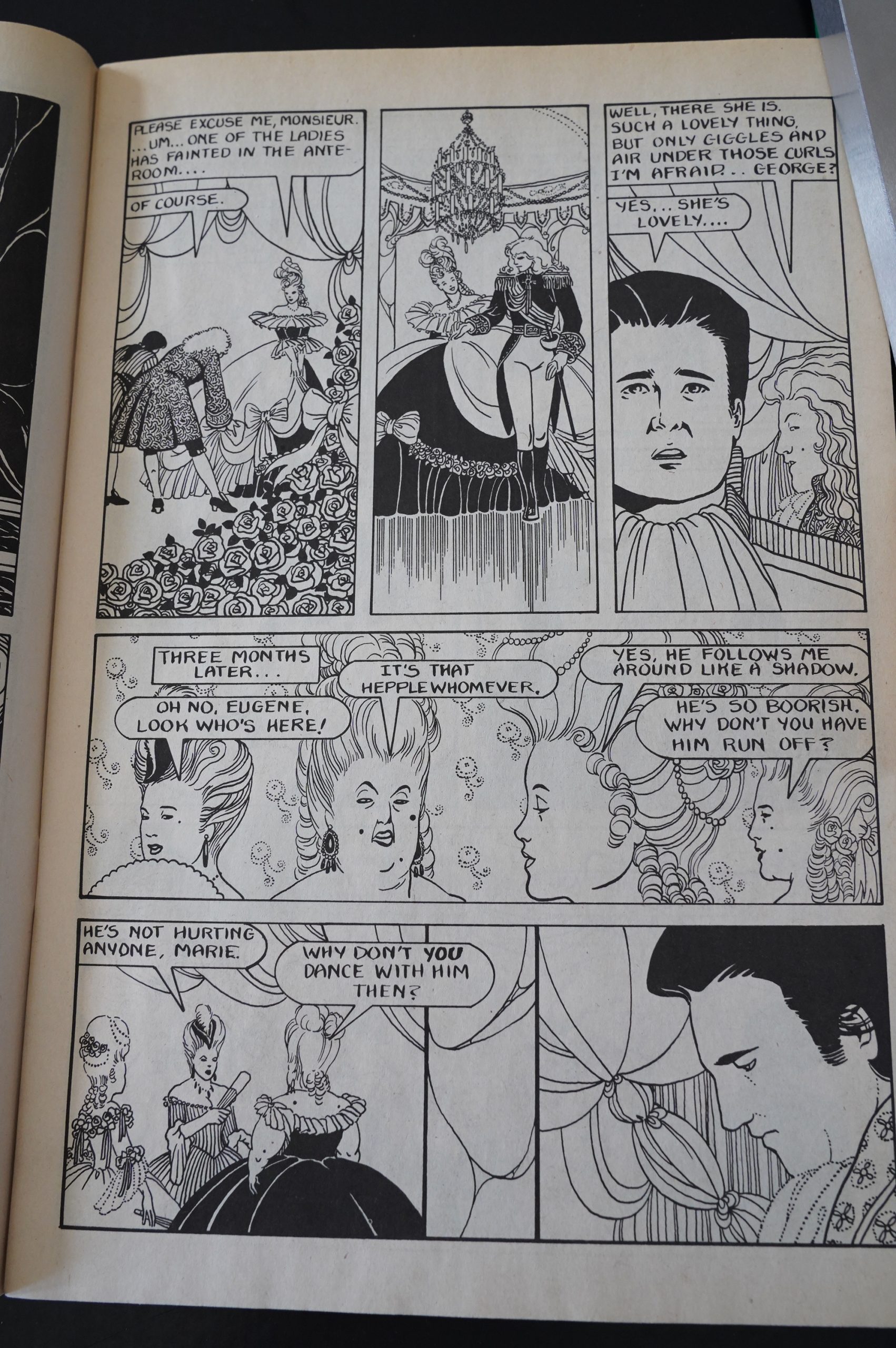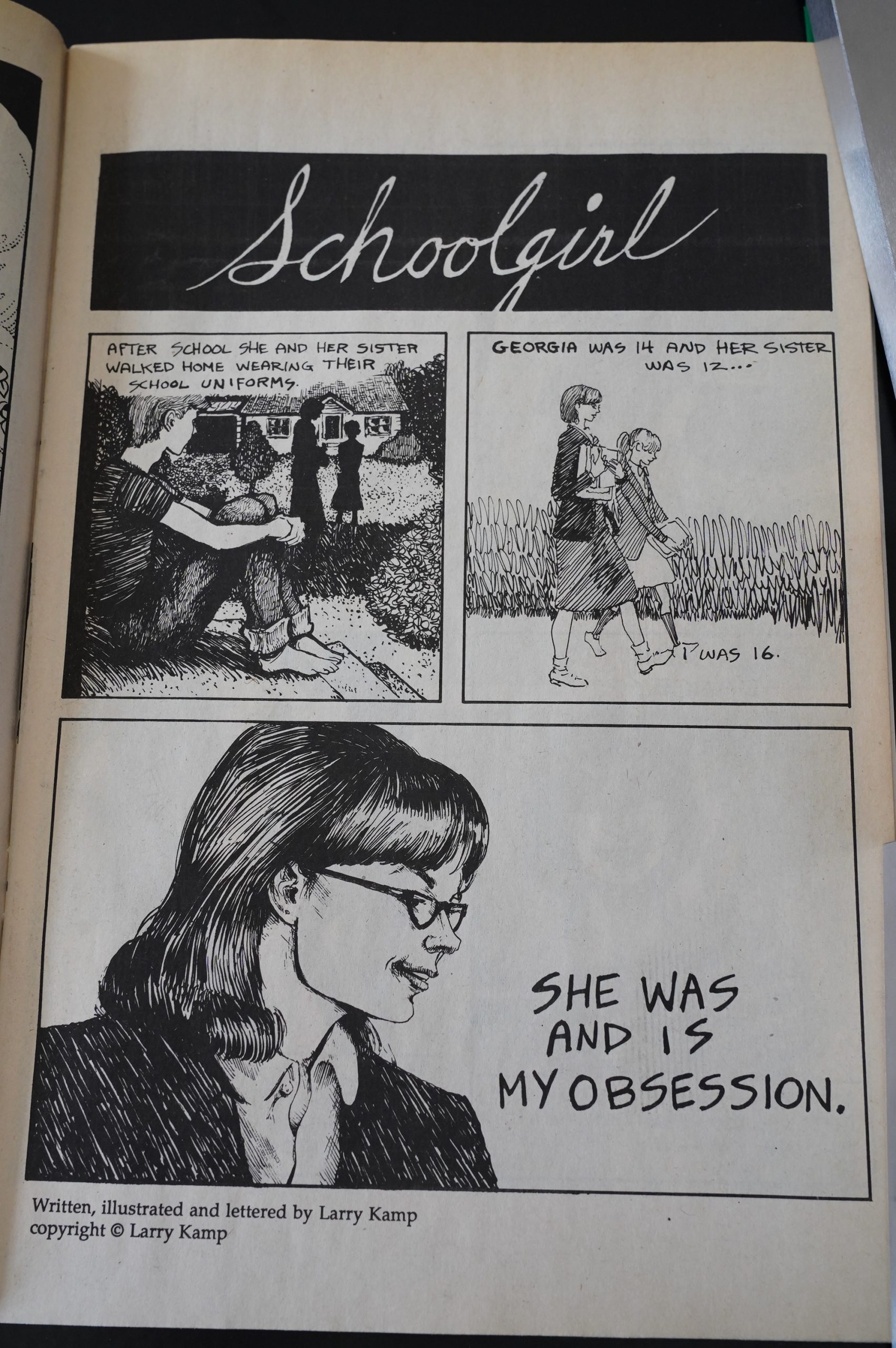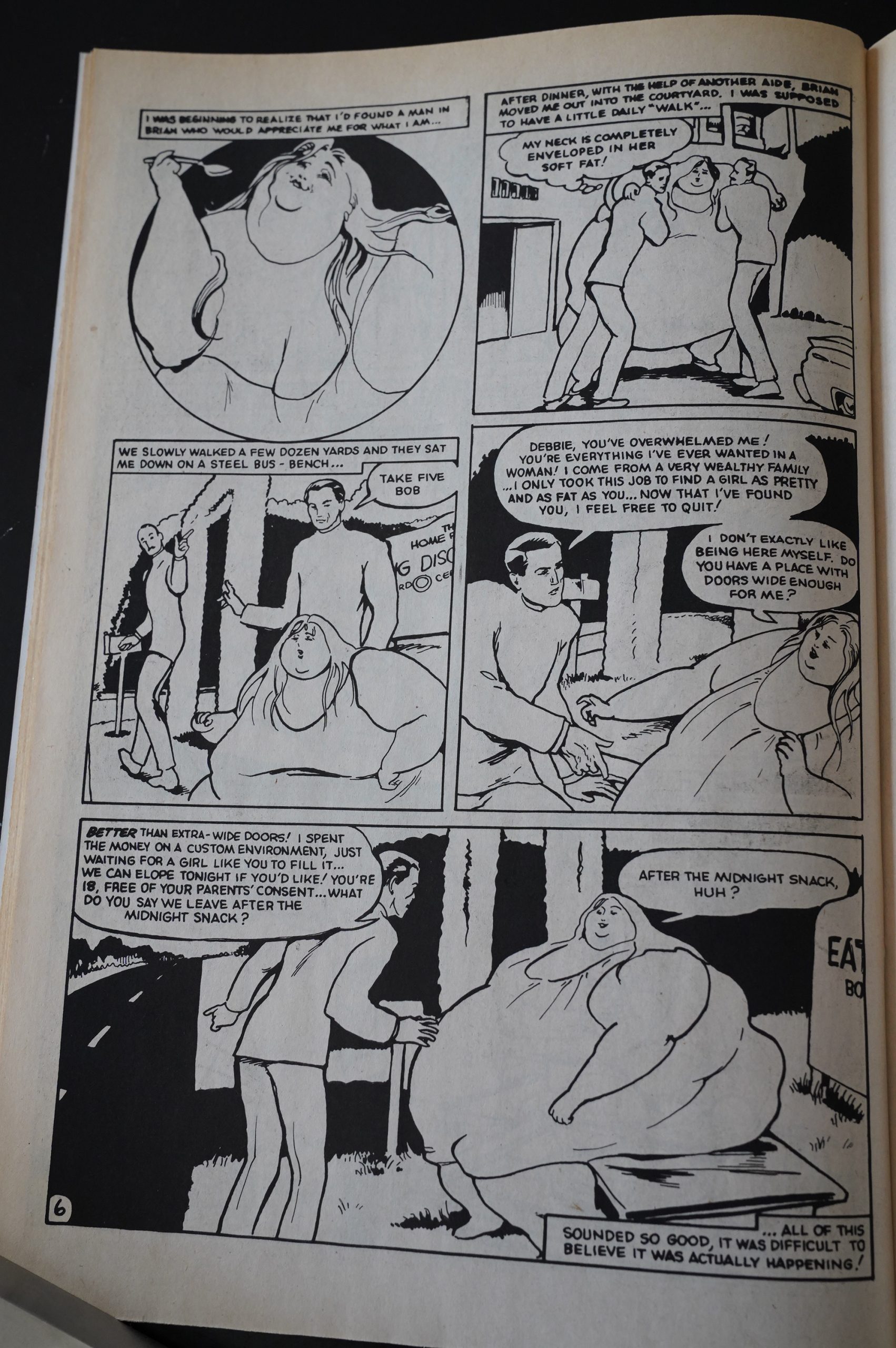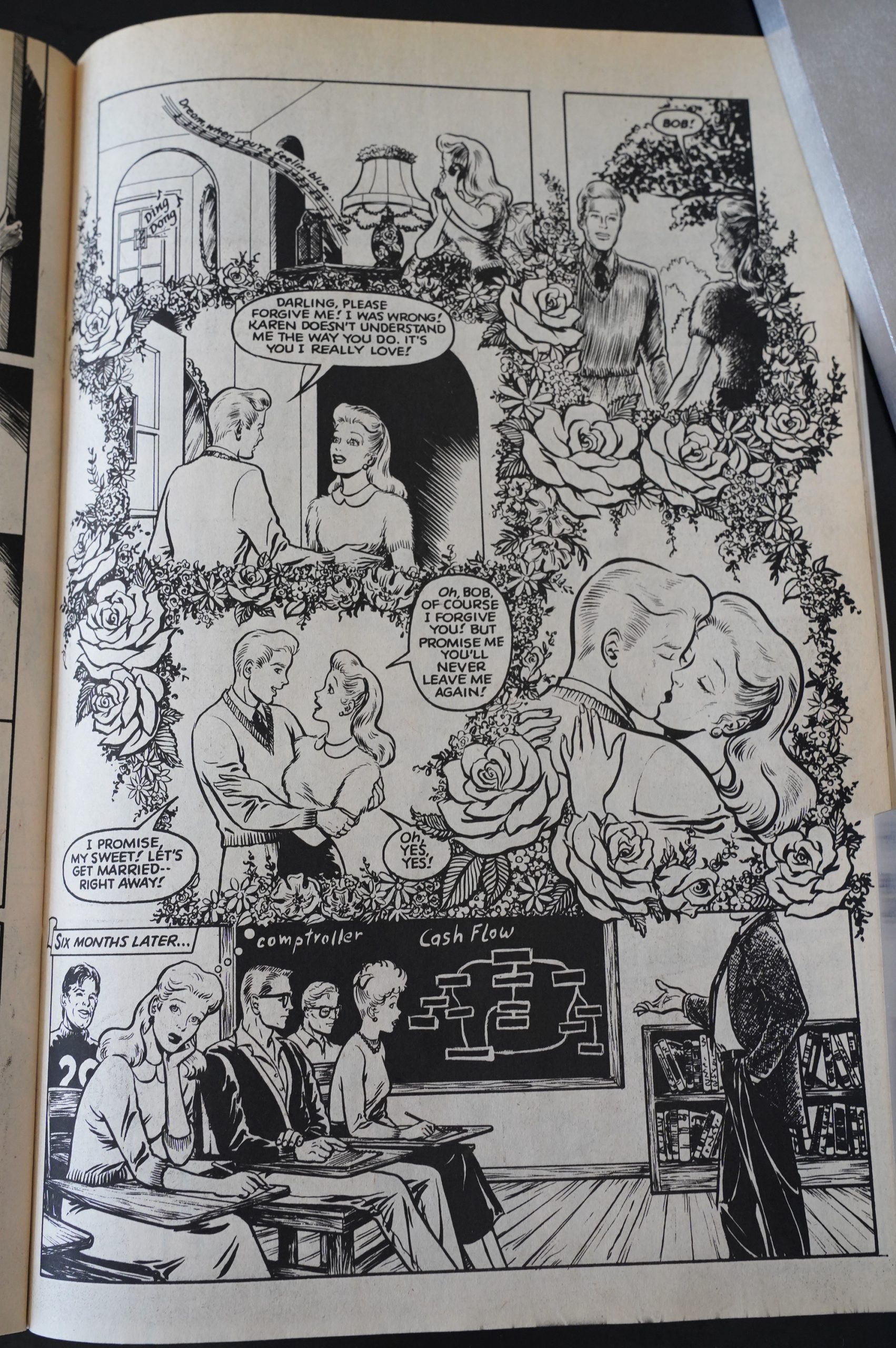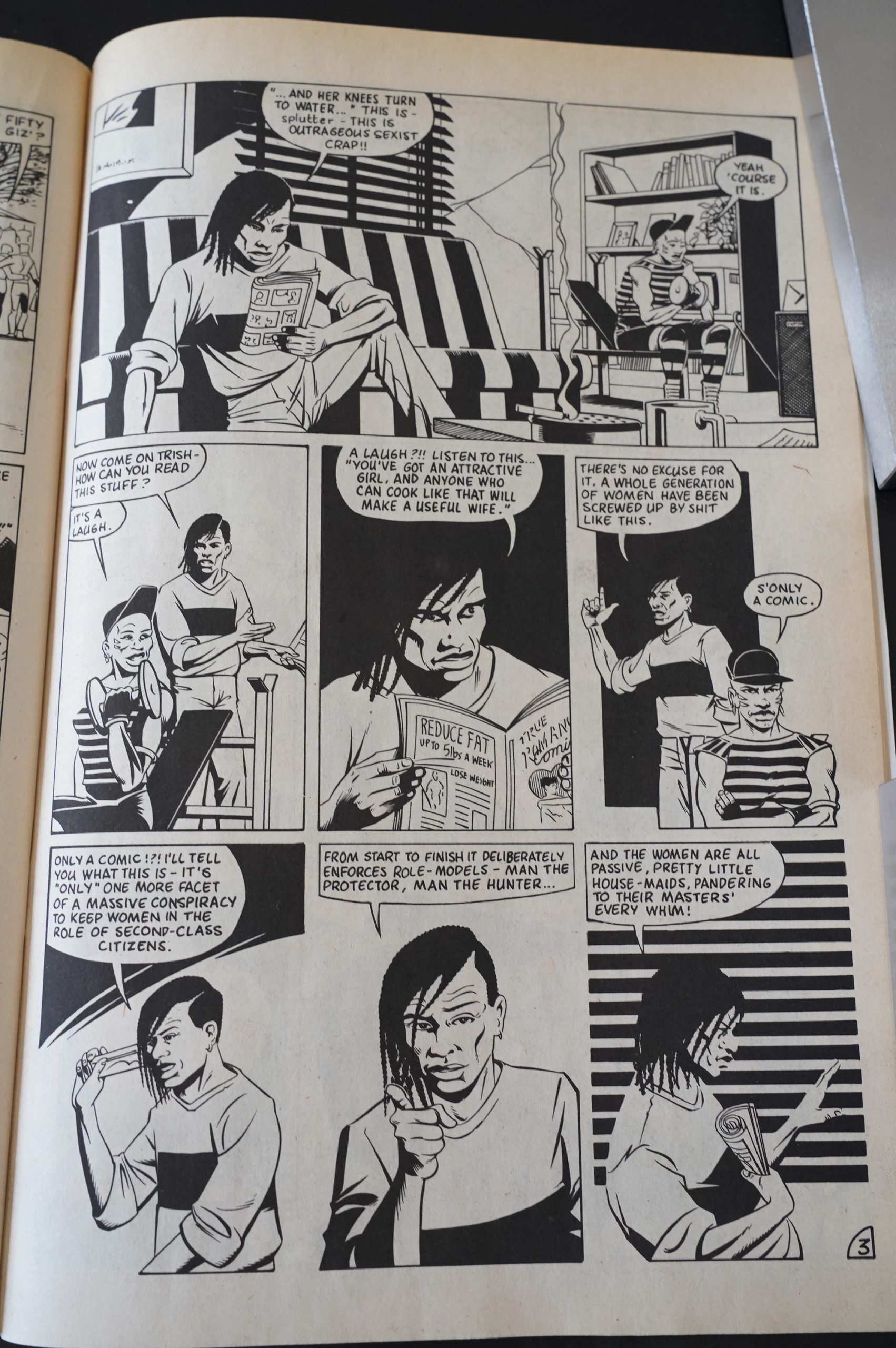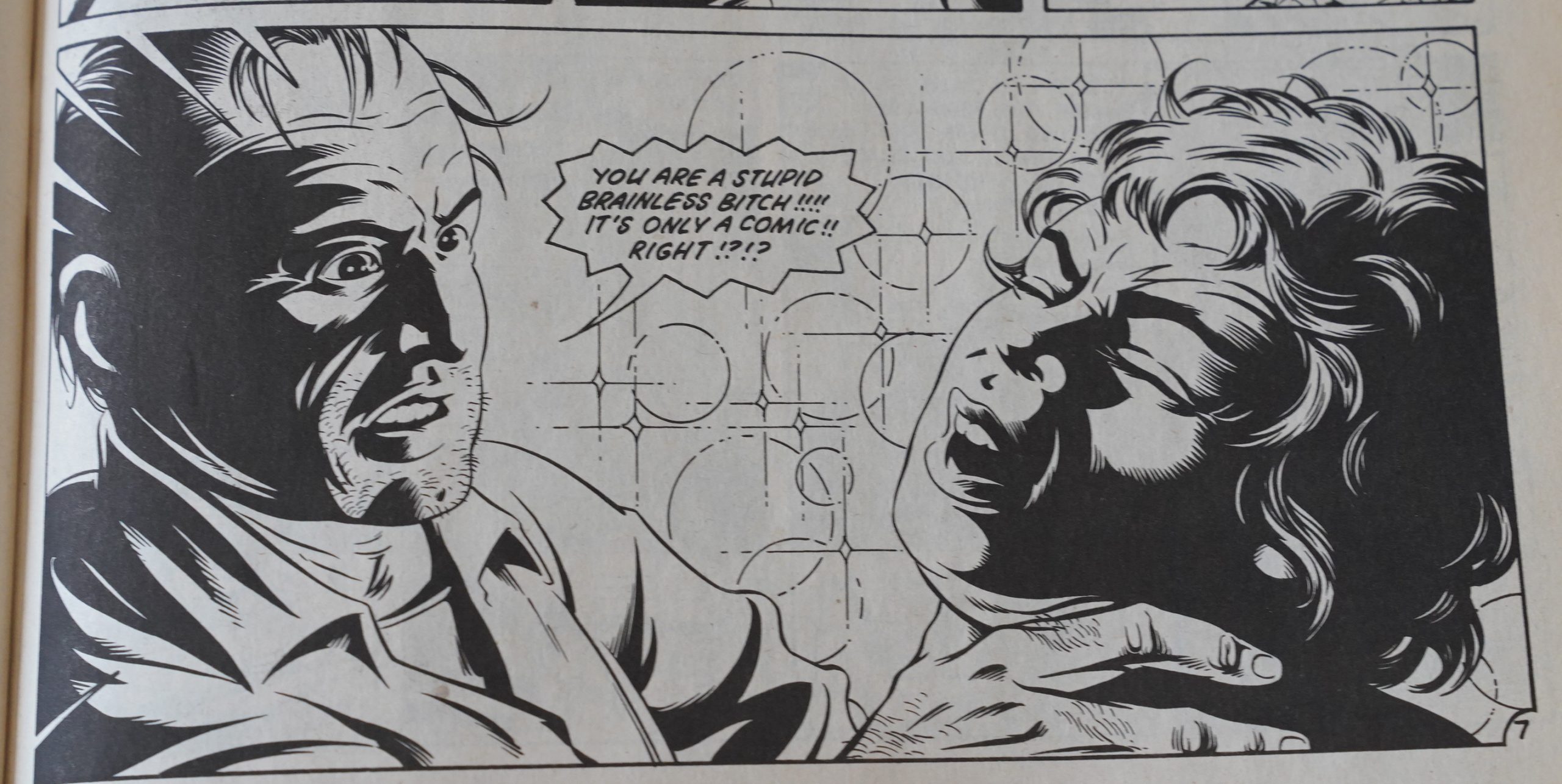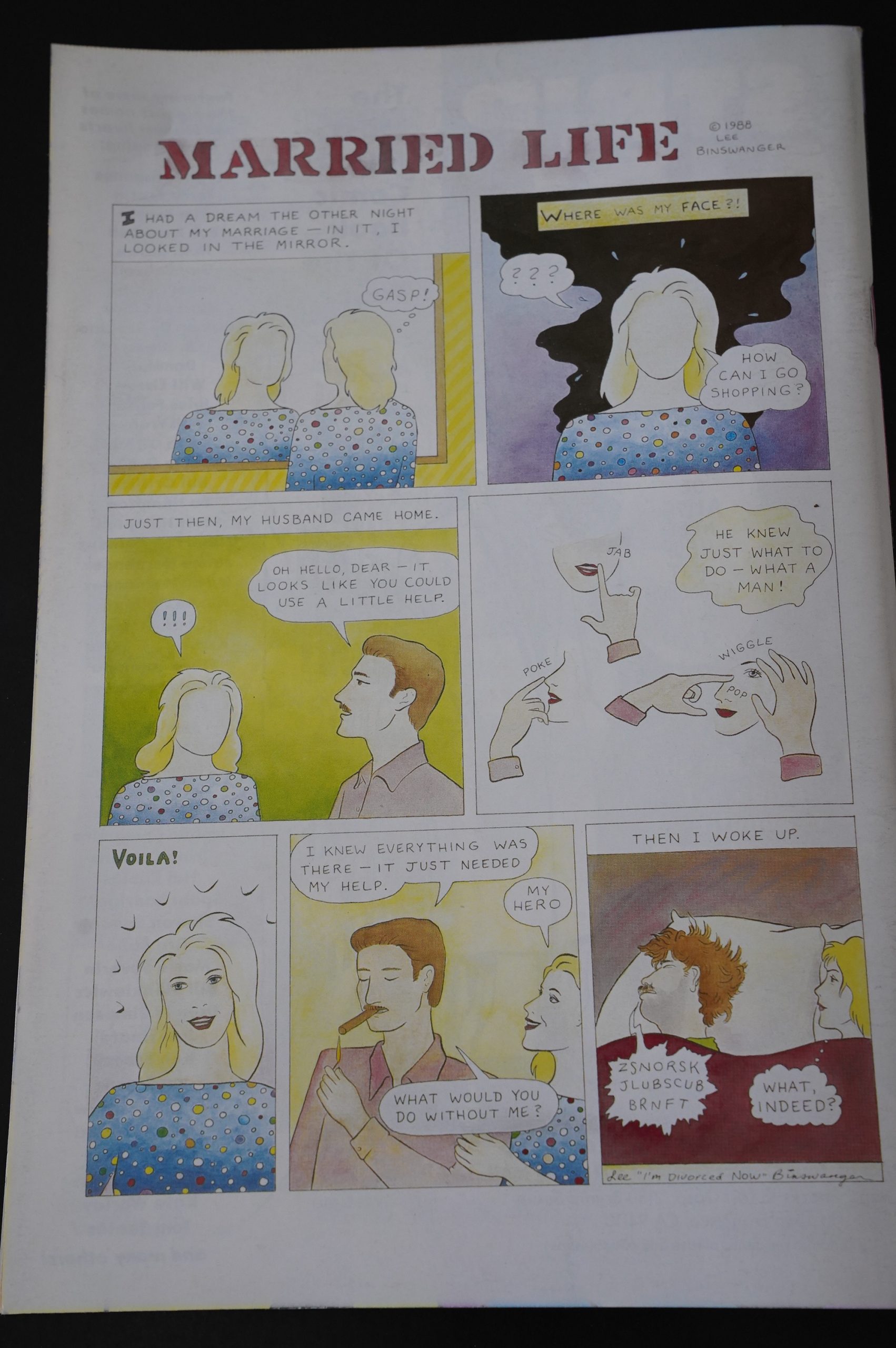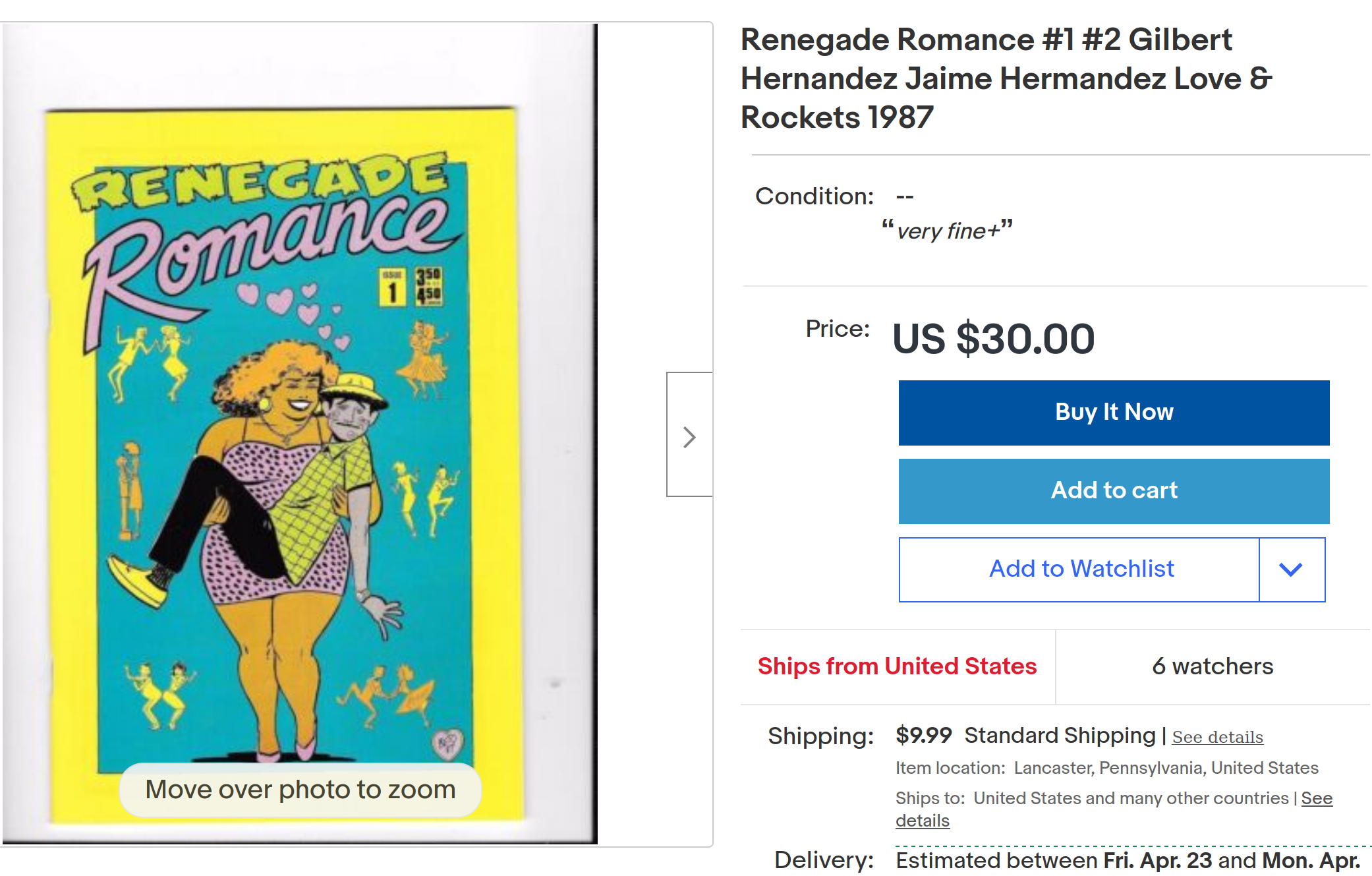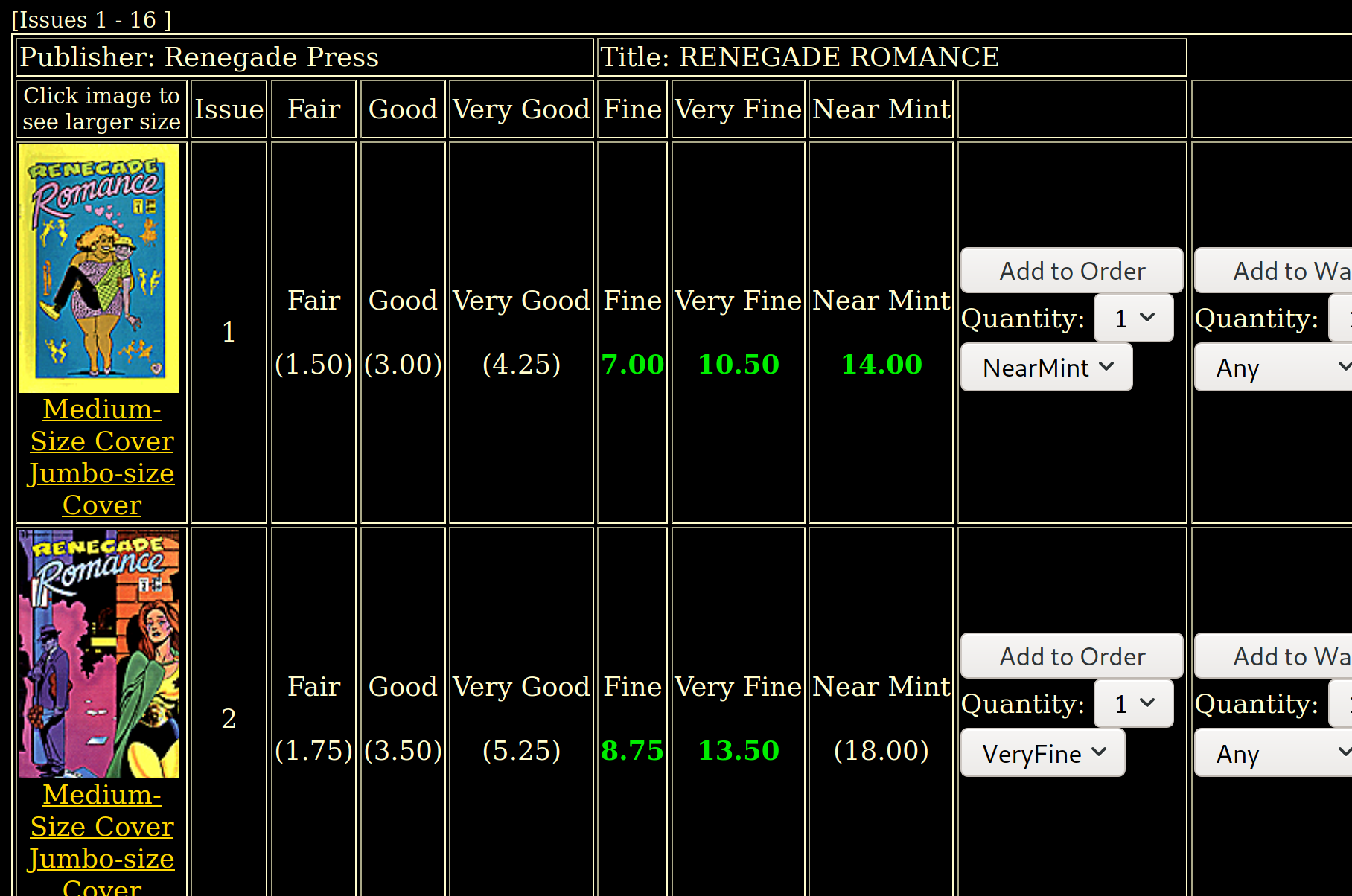Renegade Romance (1987) #1-2 edited by Deni Loubert with Trina Robbins
Ah, these are comics I remember fondly from when I was a teenager, but I haven’t read them since then. That’s a nice pair of covers from the Hernandez brothers, isn’t it?
As usual, I’m bewildered at how little hard selling is going on — you’d expect the covers would mention the name artists featured inside… or at least mention that these two issues are (respectively) 48 and 64 pages (to justify the then-exorbitant price of $3.50 to a very price-conscious (I mean penny pinching) comics store audience).
I don’t know whether that’d because hucksterism just wasn’t in Loubert’s DNA, or whether she wanted to preserve the integrity of these covers…
As Loubert explains, doing romance comics in the 80s was something of a cause célèbre: Lots of people wanted to see romance comics become a thing again, but everybody pretty much agreed that it wasn’t commercially viable.
We start off with the story with the longest credit list: Jackie Estrada, Steven Sullivan, Bret Blevins and Al Williamson (*phew*). I’m guessing Williamson ws the inker here. Isn’t that a lovely romance page? With more effort put into it than you’d expect from a project like this: You’ve gotta assume there wasn’t much money involved.
When doing a new romance comic, there’s a bunch of different approaches you could take: Doing it as parody, or do a pastiche, or trying to actually update the conventions… I think this is a sincere attempt at the latter, so here we have the most romantic one night stand with a married man ever (but using classic romance storytelling conventions). It’s pretty wistful.
Oh, I remember this piece well. Mario Hernandez goes more for relationship drama: That woman goes off to a party on her own, and we see the guy getting more and more worried as the night stretches on and she doesn’t return. He goes through worry, then jealousy, then anger, before arriving at… this.
It’s not exactly clear what we’re supposed to feel about his feelings, either: It’s nicely ambiguous and feels very true to life.
Angela Bocage does a one-pager that’s more underground than the rest of the contributions.
Cynthia Martin does a longer piece that’s halfway between an actual gothic romance and a parody of one.
Mary Wilshire! Her artwork’s so lovely, especially with these washes… whatever happened to her? I remember her popping up in various anthologies in the 80s… Oh, she went on to do mainstream stuff.
This is a quite interesting story, as usual.
The longest thing here, by far, is this story (adapted from a novel by Alexandra Kollontay) by Trina Robbins. It’s the only story that continues through the two issues, and it’s about 24 pages in total.
It’s really cool! It’s set in the Soviet Union during the revolution. Which is fun. The first half is just about perfect, but it gets bogged down in the second half — it seems slightly repetetive somehow.
J R Swanson and Krystine Kryttre goes for a more underground history of the sexes — it’s funny, but it’s not really… romance…
Bob Rozakis & Stephen DeStefano do the absolutely sweetest thing here. It’s so cuddly (but also very funny). They’ve got body language down to a T.
Deni Loubert wrote this thing (with artwork by Steve Leialoha, in a style quite unusual for him (but still looks pretty great)). I think it may be the only thing she wrote while at Renegade? Which shows great restraint.
I thought it was kinda overwritten at first, but then I fell into the rhythms, and it ended up being quite touching.
Colleen Doran’s contribution is a bit… nonsensical… even for a romance thing.
Larry Kemp does a thing about how he still dreams of fucking this 14 year old girl. (I’m paraphrasing slightly.) It’s… creepy?
With this strip, I think we’re into romance parody territory. It’s apparently adapted from a story by Willie Prader (by Ned Sonntag), and it’s about a rich guy interning at a fat farm until he can find somebody absolutely stupendously obese he can carry off (not literally) to his mansion (for more eating and presumably fucking).
I guess it… fat positive?
Jackie Estrada again, but this time with artwork by the always-lovely Barb Rausch. Look! It’s so pretty!
And it’s the saddest, most depressing thing in the series. I think they’re aiming for “wistful”, but instead it’s kinda crushing — it’s all about a life wasted… wasted in fantasy.
There’s only a single piece that comments on the genre itself. David Hine’s story is about a single romance comic that wanders from person to person, and we see how people react to it, from this pair — the woman thinks it’s a lark, an the guy thinks it’s sexist twaddle…
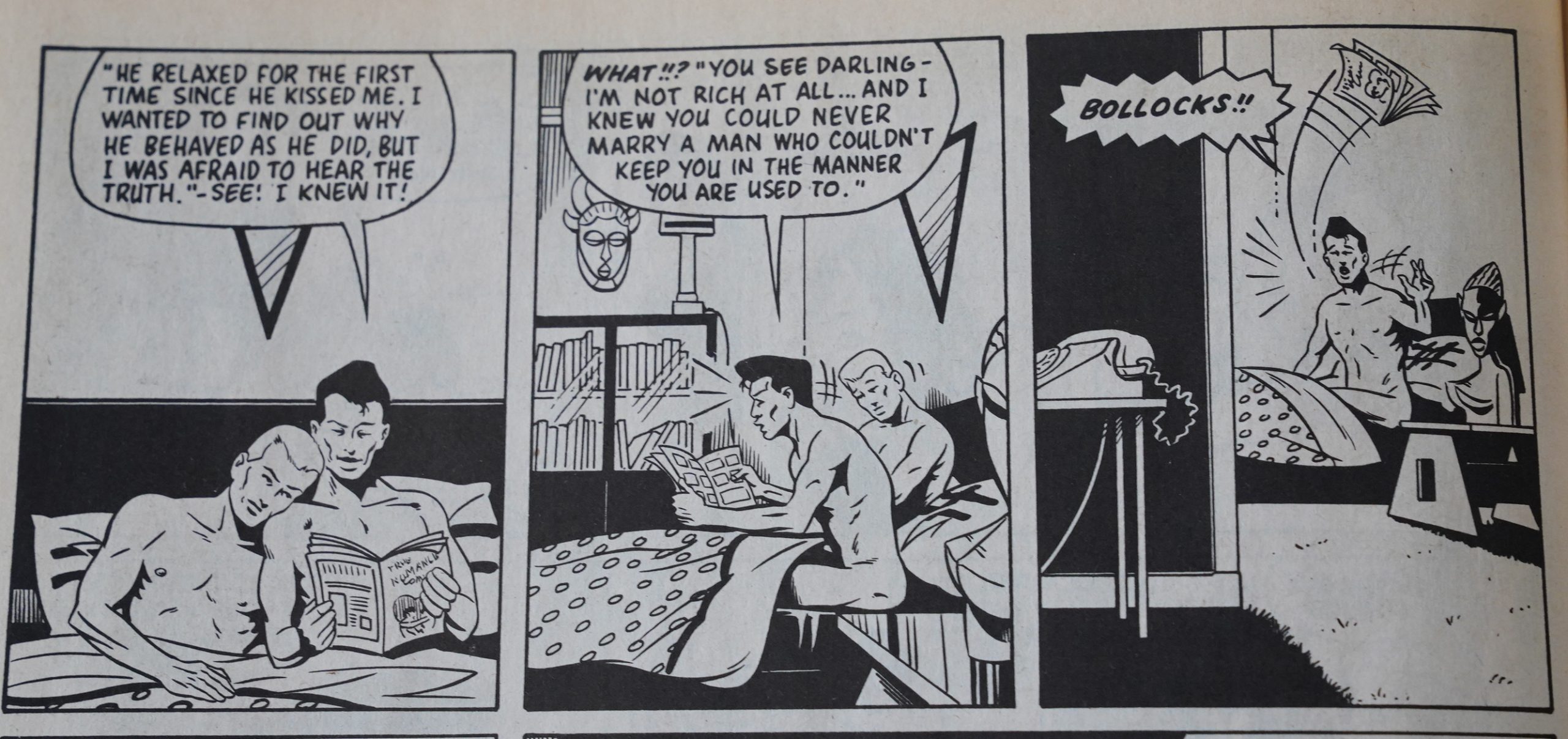
… to this pair, the only gay people who appear in this anthology, who are angered by the lack of gay representation…
… to this guy who beats up his wife after finding her with it. (She excuses him to her daughter, and does not leave him.)
It’s really well done, and it’s powerful.
Lee Binswanger rounds out the final issue.
So! That was a really successful anthology; it’s a shame it only lasted two issues. You can tell that almost everybody involved were really on board with the project, and contributed strong pieces. It’s among the best stuff Renegade ever published.
Perhaps Loubert should have edited more titles?
The Comics Journal #119, page 47:
Though the first issue of Renegade
Romance is uneven, the results are
generally positive. What’s appealing
about the book is the range of diverse
styles and approaches to the storytell-
ing. The book features the application
of sophisticated talent to material not
normally managed in a sophisticated
way. This makes for some very plea-
sant surprises.
The lead feature, ‘Art Lovers,” has
considerable appeal, joining a
straightforward story to lovely art. It
is the tale of a romantic encounted be-
tween a beautiful San Francisco art
gallery worker and a famous Massa-
chusetts artist. (The male character is
modelled after Frank Frazetta, unless
I misinterpreted some strong visual
cues.) It is a sort of Brief Encounter
set in the art world—you appreciate
the fact that nothing earthshakingly
dramatic happens expect that two
attractive people spend the night
together—and it’s superbly done. It is
nicely written by Jackie Estrada, and
features beautiful A1 Williamson art.
Another highlight is Mario Her-
nandeis “Waiting For You.” the story
of a young fellmv who spends all night
wailing for his girlfriend to return
from a party. It has a slice-of-life edge
(the girl gets drunk and passes out for
the night at the party), and—what I
can only assume is a distinctive new
touch for a romance comic—Hernan-
dez tells the story entirely from the
male point of view. (Note the skillful
transition in the character’s emotional
mood, indicating the depth of his feel-
ings for the girl. in the last three
panels.)
Other pluses include “Love Is A
Balloon,” a pleasantly-written, well-
drawn tale of abiding affection be-
tween two older lovers: ‘Art Heart,”
another encounter between two art
lovers, in which Mary Wilshire
sketches the psychic link that can be
communicated between artist and ad-
mirer; and “Red Love.” the first part
of Trina’s adaptation of a Russian
novel about love between two
Bolshevik revolutionaries by
Alexandra Kollontay.
I was caught up in the spirit of
Renegade Romance, even as part of
me rebelled against the gooey sen-
sititivy of the couple in the Wilshire
story or the clunky contrivances of
Trina’s Bolshevik romance. It’s an ape
pealing project. though. Renegade
Romance is a refreshing addition to
the world of contemporary comics.
Chris McCubbin writes in Amazing Heroes #152, page 83:
Although touted as a modern-day,
“grown-up” version of the old
romance comics, Renegade Romance
is less that than a showcase where
some of the finest artists and
storytellers in the industry do
sensitive, adult stories with a common
theme of human relationships.
This issue leads off with a
seemingly-autobiographical story
written by publisher Deni Loubert
herself and illustrated by Steve
Leialoha. The story is not
exceptional, but does manage to be
genuinely moving, and Leialoha’s art
is, as always, excellent.
Next up is “Eugene,” by Colleen
Doran, a lovely bit of costumed fluff.
We can forgive Doran the vacuous
plot, because the story is a perfect
setting for Doran’s patented pretty-
people art style.
“Red Love,” by Trina Robbins,
was, for me, the issue’s biggest
disappointment. Although Robbins’s
art is always a delight, this whiny,
sordid, and colorless story (adapted
from a Russian novel) does nothing
and goes nowhere. This story is yet
another example of how Robbins lets
her pretentions of significance
undermine her very real storytelling
gift.
I enjoyed Ned Sonntag’s “Midnite
Snack” immensely (pun intended).
This story about an unnaturally obese
woman who finds true love with a
distinctly kinky fat-farm orderly is
told with a nasty deadpan sense of
humor which forcefully drives home
its satirical point about how, in spite
of our cultural prejudices, beauty still
remains in the eye of the beholder.
“Daydreams,” by Jackie Estrada
and Barb Rausch, is the closest to a
grown-up version of the classic comic
book romance story. It also represents
the most effective and expressive art
I’ve yet seen from Rausch, who I
never thought of as an Artist to Watch
until I saw this story.
“True Romance,” by Dave Hine,
also plays hommage to the old
romance books in a completely
different way. The story follows a
’60s romance comic through the
hands of several contemporary
couples, contrasting the simple
romanticism of the old comic with the
labyrantine complexities of
relationships in the ’80s.
The issue ends with “Wedding
Day,”
a small
sentimental
masterpiece from Bob Rozakis and
Stephen DeStephano. This almost
wordless story begins at a wedding.
The various Wedding Vows are
illustrated with vignettes from the
lives of the married couples attending
the wedding. This short story
combines humor and pathos to create
an almost perfect example of the art
of visual storytelling. Both my wife
and I had tears in our eyes when we
finished the story. “Wedding Day”
alone is more than worth the price of
this 64 page book.
The issue also has short
autobiographical pieces by Lee
Binswanger and Larry Kamp, both of
which are quite nice, and a Jaime
Hernandez cover which e Inve and
Rockets fans will recognize as a
splash-page from an early issue of that
title.
In all, Renegade Romance cannot
be too highly recommended to anyone
who’s at least as interested in the art
of comics storytelling as in the various
adventure genres currently popular.
GRADE: MINT
The Comics Journal #127, page 19:
Debts and Rumors. But Renegade’s
debts remain. According to cartoonist
Ned Sonntag, Renegade owes him
$800 for his eight-page “Midnite
Snack” contribution to Renegade Ro-
mance #2, which he submitted in April
1988 expecting June publication and
payment shortly thereafter. Renegade
Romance #2 was ultimately released
in late December 1988.
“In late April, Trina [Robbins, the
book’s editor) calls me up with a
month deadline and a pay-on-publica-
lion pitch,” Sonntag said. “She says
send a script and she’ll send a contract
on approval. Well, nobody got a con-
tract as far as I know. She rejects the
first script, leaving me three weeks,
and says, ‘Just do something,’ so I
unearth a short story I illustrated for
Dimensions, the fat-admirers’ fan-
zine. So I eventually get a letter [Of
approval] from Trina. Then five Or six
months go by. Nada. Finally, after
numerous attempts, I get [Renegade
associate Steve] Leialoha on the
phone. He says sure, the issue was
printed, but the printer impounded all
the issues Deni hadn’t paid her
bills in a year.
‘ ‘The word from Trina on the future
Of Renegade Press is that [Loubertl’s
waiting tables to pay off her debt, that
she’s trying to pay off her creators and
not go bankrupt and stiff us all, and
then get out of business,” Sonntag
said.[…]
But both Robbins and Leialoha
disputed Sonntag outright.
“Ned really misunderstood what I
was saying.” Robbins said. “Deni is
and has been slow in paying, and I
don’t know that that will be a secret
to anyone — everyone knows she’s
somewhat casual with the way her
books come out, but she does pay her
creators, and she is very slowly pay-
ing the printers, getting the money
together and then payiny the printer
and printing the books. ‘
Said Leialoha: “All I know is she
pays them and then they ship them.
Krypto the Acid Dog was supposed to
be out sooner than it was, but Deni had
a cashflow problem and since [Pre-
rryl’ve been printing for her for a long
time — she found Preney; they’d pro-
bably never have started printing com-
ics if not for her; Cerebus is still
printed there — so they’re On good
terms. so, when she sends them some-
thing, they print it, and then she pays
them and they ship them.”
Leialoha said “I have no idea”
about Sonntag ‘ s claim that Loubert is
waiting tables to generate cash: • ‘That
doesn’t sound right to me.’
“Deni is simply cutting back. She
just has a few in mind she
wanted to continue drop the books
that weren’t doing well, that she’s
doing other things,” he said.
Robbins added, “There area lot of
publishers who are late in payments,
you know — I won’t do this, but I
could give you a list; this is hardly
unusual.
“And in fact,” she said, “l know
she’s now paid Ned.”
So that’s why the Sonntag piece seemed to out of place — it was originally done for a porn fanzine? Hm… Oh, it’s not porn.
Where Love Fantasy explores
modern relationships in rather
familiar settings and situations,
Renegade Romance gives us a
glimpse at the kaleidoscopic variety
with which love stories maybe told.
Cynthia Martin gives us a lushly-
rendered, very smart-alecky story
about a woman whose husband Imtes
a dead. but uncorrupted •saint;
among the grotesque scenes of the
man collecting spiders as offerings
to his beloved are lots of sharp little
references and intentional cliches
(“The honeymoon was over.” “Dang
it, can’t help lovin’ that man of
mine”). I wish I understood the
ending, better.
Trina Robbins turns in the first
half of “Red Love.” her stylish
adaptation of a novel by Alexandra
Kollontay. It’s a fascinating little
story of politics, infatuation, and
infidelity during the Bolshevik
revolution… and. hoo boy, is it
Russian! I would buy this just to
read lines like,
“all my life.
Vassilissa Dernentyevna. I have
guarded my heart and my love. I am
keeping them for a pure girl.” As
always. Trina’s art is pretty and her
storyttelling simple but effective.
Other stories are more contem-
porary and familiar in milieu.[…]
But favorite piece in the whole
issue is “Love Is a Balloon” by Bob
Rozakis and Stephen DeStefano.[…]
The
metaphor is perfect, the observa-
tions of life funny and true, the effect
delightful.
Apparently there will be stories in
the published comic which were not
yet available for review: One by A1
Williamson, one by Mario
Hernandez, and possibly more. But
even without those. I can see that
this is a very enjoyable argument for
the value of romance as a comic
book subject.
Trina Robbins writes in The Comics Journal #129, page 35:
RE: Ned Sonntag’s allegations [see Newswarch:
“Renegade ‘Refits’ Publishing Stategy,” Journal
#1271: Yes, 1 DID tell him, “The check’s in the
mail,” and then crack up, because I know what
a classic cop-out Statement that is. Except the
funny thing is, the check really WAS in the mail.
It’s too bad Ned couldnt just have waited a while
before complaining to the press, or that he
couldn’t have believed me when I told him that
payment would be slow in coming, but that it
WOULD arrive.
That the independents are notoriously slow in
paying, and even in getting their books out on
time, is no secret. One company, which I am still
on gocxi terms with, O•wed me money for almost
a year before paying me. Another is currently
way overdue, and, I suspect, may have no inten•
tions of paying me, in which case it will make
more sense to resort to a lawyer than to call the
press. Ned is lucky that he wasn’t working for
NOW!
Knowing what I do about the independents
doesn’t mean I will cease working for them; I
simply know enough not to expect my payment
to arrive immediately. Unfortunately, Ned dcksn’t
have a whole lot of ewience with independents,
didn’t understand this, and overreacted.
Some more clarification: I never told Ned that
he would be paid on publication, because I know
Renegade always promises payment within 30
days of publication (and, as I’ve already said,
I know that promise is an optimistic exaggera-
tion). I also never said I would send a contract,
because Deni sends the contract. If he didn’t
receive one, he should have notified Deni,
because it probably was an oversight. The
numerous Renegade Press contracts in my files
attest to the fact that Deni is a stickler for
contracts.
Last, somehow Ned makes it sound as though
I were begging him todo something — anything
— for Renegade Romance. The truth is that HE
solicited US. He sent a cover letter to Deni, along
with examples of his work, asking to do some-
thing for Renegade Romance. I was delighted
because he is an excellent cartoonist — it simp•
ly hadn’t occured to me that he’d have been in-
terested — and called him.
Hey, what’s this “La Robbins” stuff? Did he
REALLY call me that?
The Fditors reply: Actually, he wrote “La Rob-
bins” in a letter to us.
I kinda guessed from the story that Sonntag was something of an asshole.
Steve Leialoha writes in The Comics Journal #129, page 35:
I’d like to make two corrections to your article
on Renegade Press. Ned Sonntag refers to me
as a “Renegade Associate.” While I have done
some uork for Renegade, that hardly qualifies
me as an associate. (Although I have associated
with Deni Loubert, which isn’t the same thing.
In fact, I remember an amusing evening at a
Chinese restaurant with Deni and Gary Groth
and a few other comics professionals who are
no longer speaking to each other, but that’s
another story. I only spoke to Ned about the
situation at Renegade because I happened to
answer the phone when he called.
The other correction is more important. You
quote me referring to “Krypto the Acid Dog.”
That should have read “Trypto the Acid Dog.”
Krypto is, I believe, some other dog from some
other comics publisher. They killed him off, I
hear. Our dog, Trypto, is a whole other dog who
stars in his own book from Renegade Press. Writ-
ten by Bill Mumy and Miguel Ferrer and drawn
myself, Trypto is based on Miguel’s dog Davy,
an Engli’h Bull Terrier with jaws of iron. Good
boy..
This distinction is important as I hear that the
Other comics company has lawyers that sue at
the drop of a hat.
Heh.
Sonntag writes in The Comics Journal #130, page 54:
I just got the Christin/Bilal issue [Journal #1291
and, if you wanna fill letercol space with ancient
history, Ill briefly rebut La Robbins’ rebuttal.
l. The check was not in the mail. It was put
in the mail 10 days after Trina said it was in the
mail, which was three days after Deni [Loubert,
publisher of the now inactive Renegade Press,
see Newswatch] told her it was in the mail.
2. I figured it might come eventually, though
there seemed to be some doubt a couple of
months earlier, but now money is worth more
than future money!
3. I should’ve known I’d get screwed? Blame
the victim! The Central Park jogger should’ve
known she’d get raped and beaten!
4. I worked a lot for the undergrounds in the
’70s. Things bottomed out in ’74 and I walked
away except for two more issues Of Young Lust.
When Trina called to hire me, five months after
I sent samples to Deni, I said to her, “Is this pay
on acceptance or pay on publication?” she said,
‘ ‘s pay on publication; aren ‘t they all?” TOO
bad I didn’t tape record this. I replied, “I uouldnt
know; I haven’t done West Coast comics in 12
years.”
This would’ve been the time for a mensch to
say, “Look, it could take a year to get paid.” But
the gang of three were desperate! The deadline
was a month off. Mary Wilshire had refused to
do a second issue. Houard Chaykin had been ap-
proached and had refused.
5. “He solicited us.” Trina and Steve [Leia-
Iohal claim not to be business associates of Deni’s
(something the Journal dug up, not my refer-
ence), yet notice this phrasing. Trina claims to
be a great liberal/democrat/socialist and sleeps
with a portrait Of FDR over her bed, yet if you
look at this as labor vs. management, look where
her sympathies lie.
6. When I reached Trina the first time, I
asked, “What happens to the contracts?” Trina
replied, “Nobody got contracts.” Deni never
returned my phone calls, which is why I had no
choice but to call in my buddies at The Comics
Journal.
Volunteer Lawyers for the Arts cost $150 min-
imum. I should’ve spent that to shake loose a
crummy S80(P
7. Yeah, I am an excellent cartoonist, even
though I live like an animal in a fifth-floor walk-
up garrett. I tried to give La Robbins a book on
perspective and talk to her about photo-reference
back in ’75 and she exploded, ‘”This is my
style!!” I hate my “style.” I work to transcend
it. I wanna draw like A1 Williamson. Take some
life drawing classes, babe! You’re a parody Of
yourselfl You were a major figure in underground
comix and ’70s feminism, but you’ve milked it
dry. Nobody takes you seriously anymore and
now you’re covering up for Old feminist pals.
PS. Oh, yeah! Dori Seda! She croaked with
Deni owing her hundreds! Was this money sim-
ply reabsorbed into Renegade when it came due?
Sceevy !
I guess my guesses have been confirmed?
Renegade Romance has never been reprinted, and quite unusually for a Renegade title, you have to pay up for a copy:
Hm… or perhaps that’s just somebody very optimistic; there aren’t many copies available on ebay, and none of #2.
But you can get both from Mile High Comics. (And use the code word that’s usually on the front page to get 50% off.)
This blog post is part of the Renegades and Aardvarks series.
